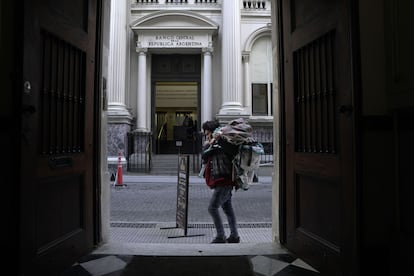Surging inflation in Argentina leaves people feeling hopeless: ‘It robs you of your dreams’
Prices rose by 88% over the last 12 months in the South American country, while the Argentine peso has lost 30% of its value


Double-digit inflation has long plagued Argentina, causing many to feel like they are getting poorer and poorer with each passing month.
In October 2022, prices in the South American country increased by 6.3% compared to the previous month. Year-over-year, however, the inflationary rates are even more damning – since October 2021, prices have gone up by an astonishing 88%. To make matters worse, over that same period of time, the Argentine peso has lost 30% of its value.
It’s extremely difficult for the average person to make long-term plans when their salaries evaporate so quickly. Signing a rental contract or investing in a business are risky endeavors amid so much volatility. Most Argentine workers are forced to live day-to-day, often holding several different jobs to make ends meet.
While the official data shows that unemployment is low (6.9%) and the economy is growing at a rate of 6.4% percent, few people feel like they’re experiencing any tangible benefits. To understand the reality behind the numbers, EL PAÍS spoke to three generations of Argentines about having to forego their dreams in the current climate.
Carla López, 21-years-old: “More than living, we’re just surviving”
Carla López wants to move out of her parents’ house, but she can’t. She used to work at a Covid-19 vaccination center, where she earned 55,000 pesos a month – about $400 when converted at the official exchange rate. But in August, the municipal government of Buenos Aires shuttered the facility, leaving her unemployed.
“I’ve been looking for work, but I can’t find anything that pays what I was earning before. I’m studying law and there’s the possibility of working as a paralegal… but that kind of job pays badly, or doesn’t pay at all,” she sighs.
López sits in Lezama Park with former colleagues from the vaccination center. They sip mate and discuss their precarious living situations. Only one of the young people present was able to briefly become financially independent two years ago – but when her relationship ended, she had to move back in with her parents.
“I don’t think about the future – it just stresses me out. I think that, more than living, we’re surviving,” says López. She also sees that her parents are more worried about money than ever.
“When I was a girl, we would take a family trip to the beach for a month every year. Then, we cut back to 15 days. Now, my parents are wondering if we can even afford to go for a week. It’s very expensive – double what my monthly salary used to be.”
Enrique Máiquez, 42-years-old: “I need two jobs – one isn’t enough”
Enrique Máiquez lives in Ezeiza, a commuter city 20 miles outside of Buenos Aires. Six years ago, he was let go from his job at a music store, due to falling sales.
“From then on, I’ve had to adjust… but things keep getting worse and worse,” he laments.
With the compensation he received from the music store, along with some savings, he bought a taxi license. He also got a job working for the municipality as a gardener.
“I thought about investing in a kiosk… but it wasn’t feasible. [Former president Mauricio] Macri raised all the fees and [tax] rates… the costs were too high.”
“I leave home at 4am and return at 7pm. I need two jobs – one isn’t enough for me. But [because of devaluation] to keep earning the same amount, I have to work more hours each year,” he explains. He has three children to support.
Máiquez recalls that the worst days of his childhood were in 1989, during the hyperinflation crisis, when his father’s salary disappeared as soon as he received it. He and his four brothers often went to bed without dinner. Now an adult, he feels that the current situation is worse.
“1989 was bad… the 2001 crisis was terrifying. But, afterwards, thank God, the economy picked up quickly. Now, it’s a slow agony. It robs you of your dreams, it takes away your hope... you see more and more poverty every day. All the politicians think about is filling their pockets, it doesn’t matter if they’re Peronists or Radicals.”
Haydé Vargas, 63-years-old: “I dreamed of buying a house… how silly of me”
Haydé Vargas was born in Peru, but has lived in Argentina since 1992. The economic situation during her first years in the country was relatively healthy: inflation was not a problem. Then-president Carlos Menem had implemented a new conversion system, by which a peso had the same value as a dollar. That artificial change stabilized prices for a decade, until everything collapsed during the crisis of December 2001, when, in an effort to boost reserves, Fernando de la Rúa’s administration restricted people’s ability to withdraw cash from banks. This sparked rioting, which forced the government to resign.
“It was the best time [in the 1990s]... with ten pesos you could fill your grocery cart.”
A few days after arriving in Buenos Aires, she found work as a live-in maid. She was able to save a large part of her salary and send it back to Peru, where her daughter had stayed behind with her mother.
“I dreamed of buying a house in Peru… how silly of me. Everything got worse very quickly,” she says.
When the woman she was caring for died, Vargas found another job with much lower pay. And then, a few months later, the 2001 crisis broke out. She went back to Peru, but three years later, she returned to Argentina with her daughter.
“I would go back, but she wants to stay here, even though it is difficult because we don’t have enough. Before, we could go out to eat… now, it’s very expensive. And going out at night scares me, because there’s more crime than ever. Even small pleasures are impossible.”
Tu suscripción se está usando en otro dispositivo
¿Quieres añadir otro usuario a tu suscripción?
Si continúas leyendo en este dispositivo, no se podrá leer en el otro.
FlechaTu suscripción se está usando en otro dispositivo y solo puedes acceder a EL PAÍS desde un dispositivo a la vez.
Si quieres compartir tu cuenta, cambia tu suscripción a la modalidad Premium, así podrás añadir otro usuario. Cada uno accederá con su propia cuenta de email, lo que os permitirá personalizar vuestra experiencia en EL PAÍS.
¿Tienes una suscripción de empresa? Accede aquí para contratar más cuentas.
En el caso de no saber quién está usando tu cuenta, te recomendamos cambiar tu contraseña aquí.
Si decides continuar compartiendo tu cuenta, este mensaje se mostrará en tu dispositivo y en el de la otra persona que está usando tu cuenta de forma indefinida, afectando a tu experiencia de lectura. Puedes consultar aquí los términos y condiciones de la suscripción digital.








































